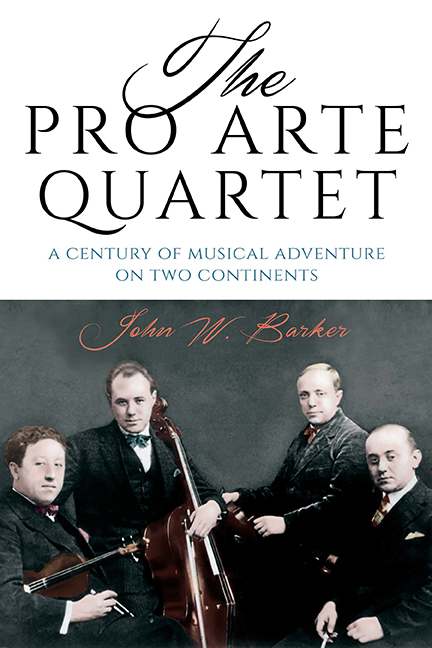Book contents
- Frontmatter
- Dedication
- Contents
- Preface
- Lists of Quartet Membership
- Introduction: Quartet Contexts
- 1 The Onnou Years, I (1912–31)
- 2 The Onnou Years, II (1932–40)
- 3 The Brosa Years (1940–44)
- 4 The Kolisch Years (1944–67)
- 5 The Paulu Years, I (1967–79)
- 6 The Paulu Years, II (1979–95)
- 7 The Perry Years (1995–Present)
- Conclusion: Retrospect and Prospects
- Appendixes
- Selected Bibliography
- Index A Composers
- Index B General
3 - The Brosa Years (1940–44)
Published online by Cambridge University Press: 10 June 2021
- Frontmatter
- Dedication
- Contents
- Preface
- Lists of Quartet Membership
- Introduction: Quartet Contexts
- 1 The Onnou Years, I (1912–31)
- 2 The Onnou Years, II (1932–40)
- 3 The Brosa Years (1940–44)
- 4 The Kolisch Years (1944–67)
- 5 The Paulu Years, I (1967–79)
- 6 The Paulu Years, II (1979–95)
- 7 The Perry Years (1995–Present)
- Conclusion: Retrospect and Prospects
- Appendixes
- Selected Bibliography
- Index A Composers
- Index B General
Summary
What's in a Name?
There is an old joke, told in many forms, but perhaps best embodied in the one placing it at George Washington's estate, Mount Vernon. The story has it that visitors there were shown an axe and were told by their guide that this was the original axe with which young George chopped down the cherry tree. The visitors observed that the axe looked quite fresh and new. Well, explained the guide, you had to understand that it had been given three new heads and five new handles over the years. But it was still the same axe!
Applying this story to the Pro Arte Quartet situation reflects some mixed truths, amid mixed questions. Many commentators (especially European) consider the Pro Arte Quartet to have come to an end with the death of Alphonse Onnou in 1940, and the American continuation of it to be spurious or irrelevant. Both in membership and in character, they had lost their Belgian identity, and were no longer the Quatuor Pro Arte of Brussels that the musical world had known for two decades.
It is true that membership and character would change. But such circumstances were hardly unique or isolated. Many long-lived groups, most notably the Budapest Quartet, went through exactly the same changes, but they were not considered extinct when their initial configuration came to an end. The introduction of one or more new members into a quartet does, of course, involve tests of assimilation and adjustment, but these have been carried out successfully in so many cases, and none of them have given grounds for denying the reality of their continuities—with the Pro Arte or other quartets.
One concert reviewer made a pointed comparison of the Pro Arte with certain creatures in nature—starfish and such that are able to reproduce lost members and thus continue uninterrupted life.
In what continuity-deniers would have as their “last” year, one personnel change had already been carried out: Warwick Evans, a non- Belgian, was substituted for the absent Robert Maas (though, it was presumed, temporarily). The dying Onnou was replaced by Antonio Brosa. A Spaniard by birth, Brosa was an early violin prodigy. He studied in Brussels with Mathieu Crickboom (whose quartet had given the premiere of Debussy's Quartet).
- Type
- Chapter
- Information
- The Pro Arte QuartetA Century of Musical Adventure on Two Continents, pp. 82 - 110Publisher: Boydell & BrewerPrint publication year: 2017

